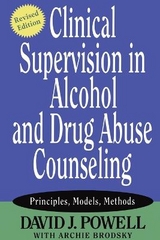
Clinical Supervision in Alcohol and Drug Abuse Counseling
Jossey-Bass Inc.,U.S. (Verlag)
978-0-7879-4074-4 (ISBN)
- Titel ist leider vergriffen;
keine Neuauflage - Artikel merken
This groundbreaking work, now available in paperback, is the standard text for the training and education of supervisors in substance abuse counseling. The blended model of treatment presented here is a synthesis of several established schools of therapy, and utilizes developmental, psychodynamic skills, and family therapy perspectives. Firmly grounded in both theory and practice, this book offers methods of supervisory contracting, observation, case presentation, modeling, intervention, and evaluation. Ethical and legal concerns are also addressed. Clinical Supervision provides the knowledge base that substance abuse supervisors will need in the coming years.
Introduction: The Need for Professionalism in Supervisory Trainingand Practice Consequences of Inadequate Supervisory Training Factors Placing a Premium on Quality Supervision. Benefits of Supervision: The Experience of the Clinical Perceptorship Program The Content and Organization of This Book. PRINCIPLES. A Historical Review of Supervision Traditional Definitions Legal Definitions Administrative Definitions Clinical Definitions Toward a Working Definition. A Working Definition of Supervision The Blended Definition of Supervision The Four Foci of Supervision Summary. Leadership Principles for Supervisors Leadership, Management, and Supervision The New Organizational Context Leadership Qualities in the New Organizational Context Servant Leadership Stakeholders The New Work Environment Making It Work. Traits of an Effective Clinical Supervisor The Two Essential Qualities Learning Objectives. MODELS. Building a Model of Clinical Supervision Blueprint for a Model Philisophical Foundation Descriptive Dimensions Stage of Development Contextual Factors The Blanded Model in Historical Perspective. A Developmental Approach to Supervision Roots of the Developmental Appraoch Developmenatal Models of Supervision: An Overview Stoltenberg and Delworth's Integrated Developmental Approach Application of the Developmental Perspective. The Psychodynamic Model Psychodynamically Oriented Definitions of Supervision Methods in Psychodynamic Supervision Selection of Patients for Supervision Counselor Development from a Psychodynamic Perspective Current Directions in Psychodynamically Oriented Supervision. The Skills ModelBasic Tenets Methods of Supervision The Task Oriented Model. Family Therapy Models Systems theory Structural Supervision Strategic Supervision The Contribution of Family Therapy to Supervision. A BlAnded Model of Clinical Supervision for the Alcoholism and Drug Abuse Field What is Substance Abuse? The Twelve Steps of recovery The Minnesota Model of Treatment Philisophical Foundation of the BlAnded Model Descriptive Dimensions. METHODS. Establishing a Supervisory Contract AgAnda for the Initial Session Getting to Know the Supervisee Goals of Supervision The Individual Development Plan Assessing the Learning Environment of Supervision. Basic Supervisory Techniques The Context of Supervision Methods of Observation Special Supervisory Environments Case Presentations Role Playing, Role Modeling, and Demonstration Feedback and Intervention The Content of Supervision. Evaluation and Feedback Determining Skill Levels Dealing with Anxiety Standards of Evaluation: Overcoming Bias Gudelines for Useful Feedback Counseling Individuals Out of the Profession Instruments for Counselor Assessmnet Instruments for Supervisor Assessment. Innovative techniques in Supervision Philosophy as Material for Supervision Effective Questions Solution-Focused Supervision In Vivo Supervision Assuming the Supervisory Role. Ethical and Legal Concerns Dual Relationships Professional Credibility Evaluation Respect Informed Consent Confidentiality Supervisee Ethics Legal Liability for Supervisors. Special Issues in Supervision Contextual Factors GAnder as a Factor in Supervision Ethnicity as a Factor in Supervision Working Within the System Resistant Counselors: Age and Recovery Issues The Impaired Counselor An Ever-Expanding Context. Directions for the Future Patients, Programs, and Priorities to the Year 2000 The Alcoholism and Drug Abuse Professional to the Year 2000 Training and Supervision Needs to the Year 2000 Conclusion. Appendix A. Competencies of Supervisors. Apendix B. Role Delineation Study for Clinical Supervisors. Appendix C. Assessing One's Preparation As A Clinical Supervisor. Appendix D. Determining Readiness to Be a Supervisor. Appendix E. Counselor Evaluation of the Supervisor. Appendix F. Counselor Evaluation of Supervision. Appendix G. Tasks of Supervision. Appendix H. Evaluation of the Supervisor in Training. Appendix I. A Design for a Clinical Supervision training Course. Appendix J. Individual Development Plan. Appendix K. Suggested Outline for Case Presentations. Appendix L. Counselor Assessment Forms.
| Erscheint lt. Verlag | 14.1.1998 |
|---|---|
| Verlagsort | New York |
| Sprache | englisch |
| Maße | 157 x 234 mm |
| Gewicht | 482 g |
| Themenwelt | Sozialwissenschaften ► Pädagogik ► Sozialpädagogik |
| Sozialwissenschaften ► Soziologie | |
| ISBN-10 | 0-7879-4074-7 / 0787940747 |
| ISBN-13 | 978-0-7879-4074-4 / 9780787940744 |
| Zustand | Neuware |
| Haben Sie eine Frage zum Produkt? |
aus dem Bereich



